
AiogramShopBot
Aiogram-based autosale bot that accepts payments in BTC, LTC, SOL and stablecoins in ERC20 and TRC20 networks.
Stars: 94
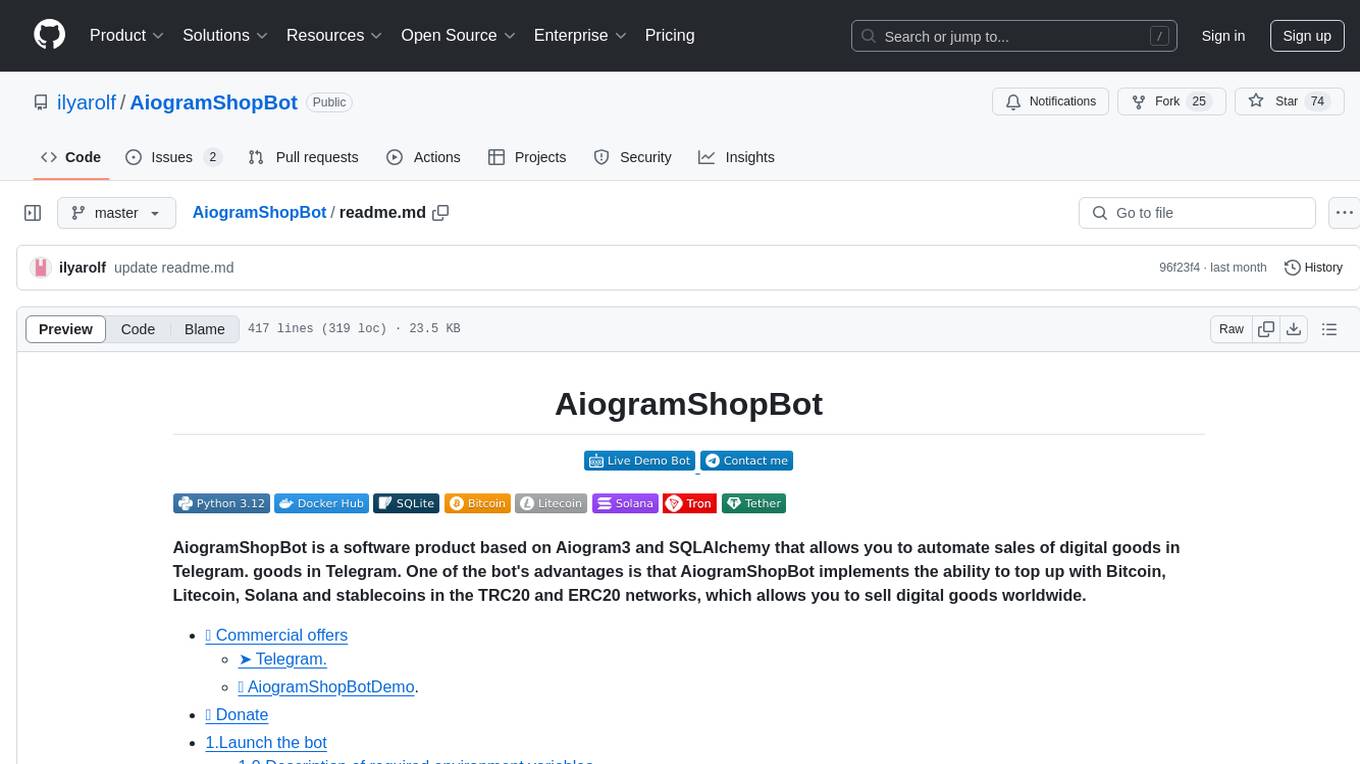
AiogramShopBot is a software product based on Aiogram3 and SQLAlchemy that allows you to automate sales of digital goods in Telegram. One of the bot's advantages is that AiogramShopBot implements the ability to top up with Bitcoin, Litecoin, Solana and stablecoins in the TRC20 and ERC20 networks, which allows you to sell digital goods worldwide. The bot provides features for user registration, balance top-up, purchase of goods, purchase history, admin functionalities like announcements, inventory management, user management, analytics & reports, and multibot functionality. It supports encryption via SQLCipher, multiple cryptocurrencies, and offers a user-friendly interface for managing sales and transactions.
README:
AiogramShopBot is a software product based on Aiogram3 and SQLAlchemy that allows you to automate sales of digital goods in Telegram. One of the bot's advantages is that AiogramShopBot implements the ability to top up with Bitcoin, Litecoin, Solana and stablecoins in the TRC20 and ERC20 networks, which allows you to sell digital goods worldwide.
- 🤝 Commercial offers
- ✨ Donate
- 1.Launch the bot
- 2. 👥 AiogramShopBot User's Manual
- 3. 🔑 AiogramShopBot Admin Manual
- 4.0 Multibot (Experimental functionality)
- 📋 Todo List
- MIT License
➤ For commercial offers contact me on Telegram.
🤖 You can test the functionality in AiogramShopBotDemo.
- BTC - bc1q2kv89q8yvf068xxw3x65gzfag98l9wnrda3x56
- LTC - ltc1q0tuvm5vqn9le5zmhvhtp7z9p2eu6yvv24ey686
- TRX - THzRw8UpTsEYBEG5CCbsCVnJzopSHFHJm6
- SOL - Avm7VAqPrwpHteXKfDTRFjpj6swEzjmj3a2KQvVDvugK
- ETH - 0xB49D720DE2630fA4C813d5B4c025706E25cF74fe
- TON - UQD0QetwXoYTsmbZWVbE_z_JUFh54RVVRUxCbCHQkLsl3Hfn
- USDT ERC20 - 0xB49D720DE2630fA4C813d5B4c025706E25cF74fe
- USDT BEP20 - 0xB49D720DE2630fA4C813d5B4c025706E25cF74fe
- USDT TRC20 - THzRw8UpTsEYBEG5CCbsCVnJzopSHFHJm6
| Environment Variable Name | Description | Recommend Value |
|---|---|---|
| WEBHOOK_PATH | The path to the webhook where Telegram servers send requests for bot updates. It is not recommended to change it if only one bot will be deployed. In case several bots will be deployed on the same server, it will be necessary to change it, because there will be path collision (Does not apply to the multibot case). | "" (empty string) |
| WEBAPP_HOST | Hostname for Telegram bot, it is not recommended to change in case you use docker-compose. | For docker-compose="0.0.0.0". For local deployment="localhost". |
| WEBAPP_PORT | Port for Telegram bot, if you plan to deploy several bots on the same server, you will need to assign a different port to each one (Not relevant to the multibot case). | No recommended value |
| TOKEN | Token from your Telegram bot, you can get it for free in Telegram from the bot of all bots with the username @botfather. | No recommended value |
| ADMIN_ID_LIST | List of Telegram id of all admins of your bot. This list is used to check for access to the admin menu. | No recommended value |
| SUPPORT_LINK | A link to the Telegram profile that will be sent by the bot to the user when the “Help” button is pressed. | https://t.me/${YOUR_USERNAME_TG} |
| DB_NAME | The name of the SQLite database file. | database.db |
| DB_ENCRYPTION | Boolean variable that enables database encryption. | "true" of "false" |
| DB_PASS | Needs only if DB_ENCRYPTION=='true'. The password that will be used to encrypt your SQLite database with SQLCipher. | Any string less than 31 characters |
| NGROK_TOKEN | Token from your NGROK profile, it is needed for port forwarding to the Internet. The main advantage of using NGROK is that NGROK assigns the HTTPS certificate for free. | No recommended value |
| PAGE_ENTRIES | The number of entries per page. Serves as a variable for pagination. | 8 |
| BOT_LANGUAGE | The name of the .json file with the l10n localization. At the moment only English localization is supplied out of the box, but you can make your own if you create a file in the l10n folder with the same keys as in l10n/en.json. | "en" or "de" |
| MULTIBOT | Experimental functionality, allows you to raise several bots in one process. And there will be one main bot, where you can create other bots with the command “/add $BOT_TOKEN”. Accepts string parameters “true” or “false”. | "false" |
| ETHPLORER_API_KEY | API Key from ethplorer.io, used to get ERC20 balances. | No recommended value |
| CURRENCY | Currency to be used in the bot. | "USD" or "EUR" or "JPY" or "CAD" or "GBP" |
| RUNTIME_ENVIRONMENT | If set to "dev", the bot will be connected via an ngrok tunnel. "prod" will use Caddy as reverse proxy together with your public hostname | "prod" or "dev" |
- Clone the project.
git clone [email protected]:ilyarolf/AiogramShopBot.git - Set environment variables in docker-compose.yml file.
- Run the
docker-compose upcommand.
For local development on a computer which is not internet facing, set the "RUNTIME_ENVIRONMENT" to "dev". The bot will be connected via an ngrok tunnel.
Note
To get the ngrok token, you need to register on the ngrok website and confirm your email. Then you will have the ngrok token in your personal account.
On an internet facing production system you can either set your own hostname in the caddy label (in the template shown with "YOUR_DOMAIN_GOES_HERE" or make use of services like sslip.io. Caddy will automatically pull a TLS certificate and serves as reverse proxy for your bot. You can also run your bot together with an already existing reverse proxy. In this case you have to remove the caddy service from the docker-compose file and configure the reverse proxy accordingly.
- Clone the project from the master branch.
git clone [email protected]:ilyarolf/AiogramShopBot.git - Install all necessary packages
pip install -r requirements.txt - Set the environment variables to run in the .env file.
Example:
WEBHOOK_PATH = ""
WEBAPP_HOST = "localhost"
WEBAPP_PORT = 5000
TOKEN = "1234567890:QWER.....TYI"
ADMIN_ID_LIST = 123456,654321
SUPPORT_LINK = "https://t.me/your_username_123"
DB_NAME = "database.db"
DB_ENCRYPTION = "false"
DB_PASS = ""
NGROK_TOKEN = "NGROK_TOKEN_HERE"
PAGE_ENTRIES = 8
BOT_LANGUAGE = "en"
MULTIBOT = "false"
ETHPLORER_API_KEY = "API_KEY_HERE"
CURRENCY = "USD"
RUNTIME_ENVIRONMENT = "dev"
- After these steps the bot is ready to run, launch the bot with command
python run.py
Note
To run AiogramShopBot with database encryption via SQLCipher, you need to use Linux kernel operating systems.
- Clone the project.
branch.
git clone [email protected]:ilyarolf/AiogramShopBot.git - Install the SQLCipher package, for example in Ubuntu this can be done with the
command
sudo apt install sqlcipher. - Install all necessary packages
pip install -r requirements.txt - Install SQLCipher python package
pip install sqlcipher3 - Set the environment variables to run in the .env file.
Example:
WEBHOOK_PATH = ""
WEBAPP_HOST = "localhost"
WEBAPP_PORT = 5000
TOKEN = "1234567890:QWER.....TYI"
ADMIN_ID_LIST = 123456,654321
SUPPORT_LINK = "https://t.me/your_username_123"
DB_NAME = "database.db"
DB_ENCRYPTION = "true"
DB_PASS = "1234567890qwertyui"
NGROK_TOKEN = "NGROK_TOKEN_HERE"
PAGE_ENTRIES = 8
BOT_LANGUAGE = "en"
MULTIBOT = "false"
ETHPLORER_API_KEY = "API_KEY_HERE"
CURRENCY = "USD"
RUNTIME_ENVIRONMENT = "dev"
- After these steps the bot is ready to run, the entry point to run the bot is run.py
python run.py
User registration occurs when the bot is first accessed with the /start command. Each user is assigned a different
mnemonic phrase to generate BTC, LTC, USDT TRC20 crypto addresses. BTC and LTC addresses are generated according to
BIP-84 standard, for USDT TRC20 the BIP-44 standard is used, this is done so that wallets can be easily imported into
Trust Wallet.
- Open my profile menu using the “👤 My profile” button.
- Open top-up menu using the “➕ Top Up Balance” button.
- In the resulting menu, click on cryptocurrency name button.
- Copy cryptocurrency address, and send cryptocurrency on this address.
- Once your transaction has at least one confirmation, click on the “🔄 Refresh balance” button.
Note "Refresh balance" button has a 30 seconds cooldown.
To buy any item, go to "All categories" -> Select any category -> Select any subcategory -> Select quantity -> Confirm purchase. If the purchase is successful, you will immediately receive a message in the format:
- To access your purchase history go to "My Profile" -> "Purchase History".
- You will be presented with an inline keyboard with all your purchases, by clicking on any of the purchases you will be sent a message in the format from paragraph 2.3.
To add a new admin you need to add his telegram id to the ADMIN_ID_LIST environment variable, separated by commas, and
reload the bot.
For example: ADMIN_ID_LIST=123456,654321
- Open the admin menu using the “🔑 Admin Menu” button.
- Open the announcements menu using the “📢 Announcements” button.
- In the resulting menu, click on “📢 Send to Everyone” button.
- Type a message or forward to the bot, the bot supports sending a message with pictures and Telegram markup (bold, italics, spoilers, etc.).
- Confirm or decline the sending of messages.
- After successful message sending, the original message with inline buttons "Confirm", "Decline" will change like on
gif.
- Open the admin menu using the “🔑 Admin Menu” button.
- Open the announcements menu using the “📢 Announcements” button.
- In the resulting menu, click on “🔄 Restocking Message” button.
- This message is generated based on items in the database that have "is_new" is true.
- Open the admin menu using the “🔑 Admin Menu” button.
- Open the announcements menu using the “📢 Announcements” button.
- In the resulting menu, click on “🗂️ Current Stock” button.
- This message is generated based on items in the database that have "is_sold" is false.
- Open the admin menu using the “🔑 Admin Menu” button.
- Open the announcements menu using the “📦 Inventory Management” button.
- Open the add items menu using the “➕ Add Items” button.
- In the resulting menu, click on “JSON” button.
- Send .json file with new items.
Example of .json file:
Note The "private_data" property is what the user gets when they make a purchase.
[
{
"category": "Category#1",
"subcategory": "Subcategory#1",
"price": 50,
"description": "Mocked description",
"private_data": "Mocked private data"
},
{
"category": "Category#2",
"subcategory": "Subcategory#2",
"price": 100,
"description": "Mocked description",
"private_data": "Mocked private data"
}
]
- Open the admin menu using the “🔑 Admin Menu” button.
- Open the inventory management menu using the “📦 Inventory Management” button.
- Open the add items menu using the “➕ Add Items” button.
- In the resulting menu, click on “TXT” button.
- Send .txt file with new items.
Example of .txt file:
CATEGORY#1;SUBCATEGORY#1;DESCRIPTION#1;50.0;PRIVATE_DATA#1
CATEGORY#1;SUBCATEGORY#1;DESCRIPTION#1;50.0;PRIVATE_DATA#2
CATEGORY#1;SUBCATEGORY#1;DESCRIPTION#1;50.0;PRIVATE_DATA#3
CATEGORY#1;SUBCATEGORY#1;DESCRIPTION#1;50.0;PRIVATE_DATA#4
CATEGORY#1;SUBCATEGORY#1;DESCRIPTION#1;50.0;PRIVATE_DATA#5
CATEGORY#1;SUBCATEGORY#1;DESCRIPTION#1;50.0;PRIVATE_DATA#6
CATEGORY#1;SUBCATEGORY#1;DESCRIPTION#1;50.0;PRIVATE_DATA#7
CATEGORY#1;SUBCATEGORY#1;DESCRIPTION#1;50.0;PRIVATE_DATA#8
Note: This way, you will delete all products from “All categories” with the category or subcategory you picked and deleted.
- Open the admin menu using the “🔑 Admin Menu” button.
- Open the inventory management menu using the “📦 Inventory Management” button.
- Open the add items menu using the “🗑️ Delete Category” or “🗑️ Delete Subcategory” button.
- In the resulting menu, select the category or subcategory you want to delete.
- Confirm or cancel the deletion of the category or subcategory.
- Open the admin menu using the “🔑 Admin Menu” button.
- Open the user management menu using the “👥 User Management” button.
- Open the credit management menu using the “💳 Credit Management” button.
- In the resulting menu, click on “➕ Add balance” button.
- Send the user entity object that belongs to the user you want to add the balance to. This can be telegram id or telegram username.
- Send the value by which you want to add the balance to the user.
- Open the admin menu using the “🔑 Admin Menu” button.
- Open the user management menu using the “👥 User Management” button.
- Open the credit management menu using the “💳 Credit Management” button.
- In the resulting menu, click on “➖ Reduce balance” button.
- Send the user entity object that belongs to the user you want to add the balance to. This can be telegram id or telegram username.
- Send the value by which you want to reduce the balance to the user.
- Open the admin menu using the “🔑 Admin Menu” button.
- Open the user management menu using the “👥 User Management” button.
- Open the refund menu using the “↩️ Make Refund” button.
- In the resulting menu, click on the buy button you want to refund.
- Confirm or cancel refund.
- Open the admin menu using the “🔑 Admin Menu” button.
- Open the statistics menu using the “📊 Analytics & Reports” button.
- In the resulting menu, click on the entity for which you want to get statistics.
- In the resulting menu, click on the time period for which you want statistics.
- Open the admin menu using the “🔑 Admin Menu” button.
- Open the statistics menu using the “📊 Analytics & Reports” button.
- Click "💾 Get database file" button.
Note All users with telegram id in the .env ADMIN_ID_LIST environment variable will receive these notifications
- If any user topped up the balance and clicked on the "Refresh balance" button, you will receive the following message from the bot:
After each purchase, you will receive a message in the format:
- Set all environment variables in docker-compose.yml and set the variable “true” for MULTIBOT.
MULTIBOT="true" - Run the
docker-compose upcommand. - After successful execution of the command, you will only deploy a manager bot for other bots, it will not have
functionality for buying items etc. To deploy a bot with functionality to sell goods etc..., you need to send the
command
/add $TOKENto the bot manager. If everything is successful, you will receive this notification.
- [x] Make migration from direct raw database queries to SQLAlchemy ORM.
- [x] Add option to encrypt database via SQLCipher (when using SQLAlchemy).
- [x] Add an option to generate new crypto addresses using new mnemonic phrases so that 1 user=1 mnemonic phrase.
- [x] Items pagination.
- [x] Make the functionality of database backup by action in the admin in the Telegram bot.
- [x] Make the functionality of generating statistics of sales and users in the bot for a month/week/day in the admin panel.
- [x] Make the functionality of generating statistics of deposits in the bot for a month/week in the admin panel.
For Tasks:
Click tags to check more tools for each tasksFor Jobs:
Alternative AI tools for AiogramShopBot
Similar Open Source Tools

AiogramShopBot
AiogramShopBot is a software product based on Aiogram3 and SQLAlchemy that allows you to automate sales of digital goods in Telegram. One of the bot's advantages is that AiogramShopBot implements the ability to top up with Bitcoin, Litecoin, Solana and stablecoins in the TRC20 and ERC20 networks, which allows you to sell digital goods worldwide. The bot provides features for user registration, balance top-up, purchase of goods, purchase history, admin functionalities like announcements, inventory management, user management, analytics & reports, and multibot functionality. It supports encryption via SQLCipher, multiple cryptocurrencies, and offers a user-friendly interface for managing sales and transactions.
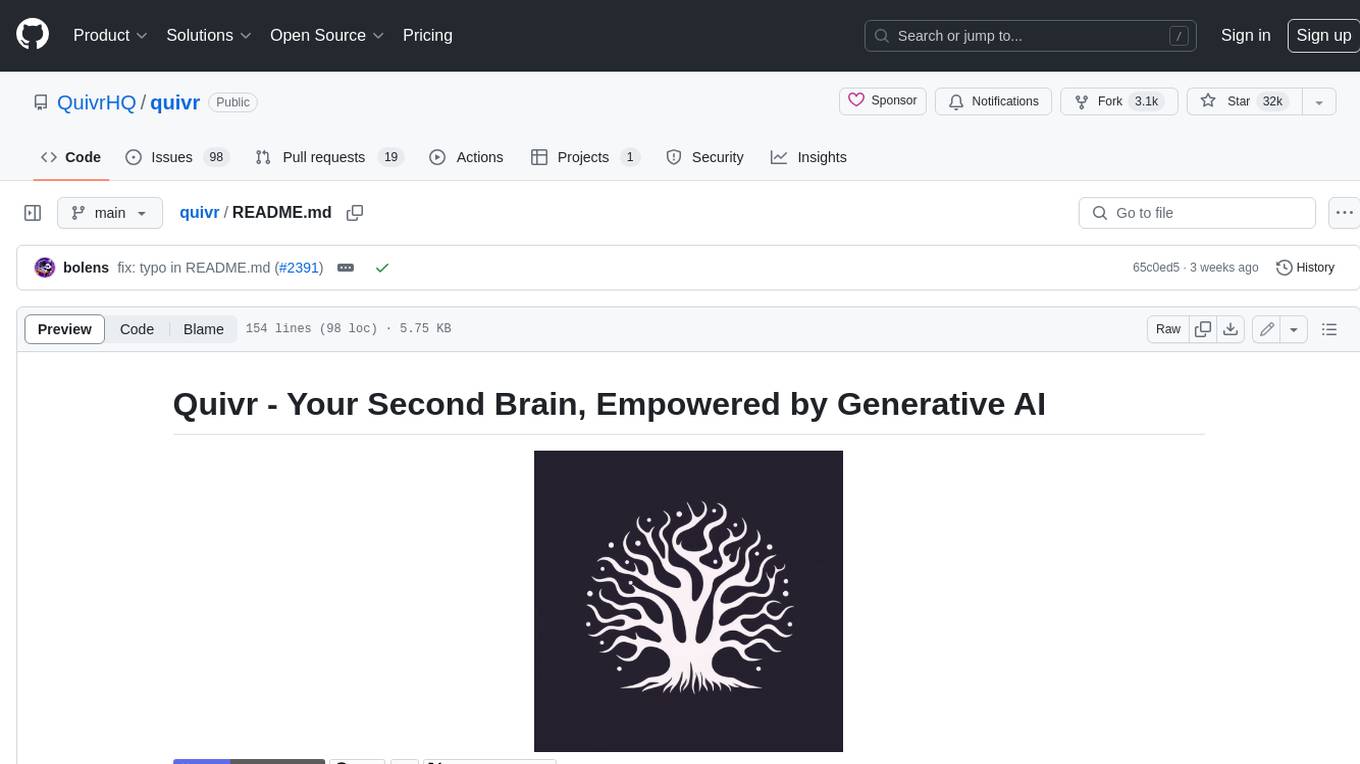
quivr
Quivr is a personal assistant powered by Generative AI, designed to be a second brain for users. It offers fast and efficient access to data, ensuring security and compatibility with various file formats. Quivr is open source and free to use, allowing users to share their brains publicly or keep them private. The marketplace feature enables users to share and utilize brains created by others, boosting productivity. Quivr's offline mode provides anytime, anywhere access to data. Key features include speed, security, OS compatibility, file compatibility, open source nature, public/private sharing options, a marketplace, and offline mode.
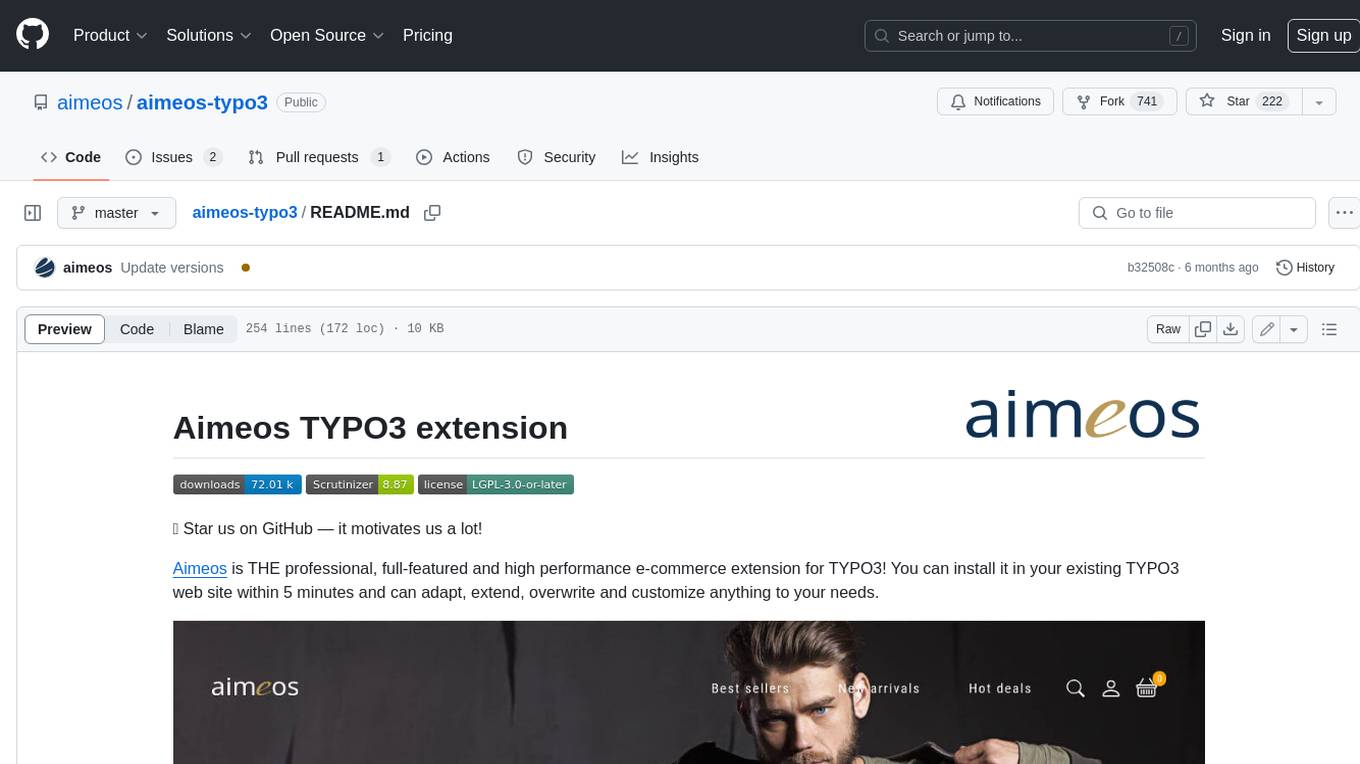
aimeos-typo3
Aimeos is a professional, full-featured, and high-performance e-commerce extension for TYPO3. It can be installed in an existing TYPO3 website within 5 minutes and can be adapted, extended, overwritten, and customized to meet specific needs.
aiconfig
AIConfig is a framework that makes it easy to build generative AI applications for production. It manages generative AI prompts, models and model parameters as JSON-serializable configs that can be version controlled, evaluated, monitored and opened in a local editor for rapid prototyping. It allows you to store and iterate on generative AI behavior separately from your application code, offering a streamlined AI development workflow.
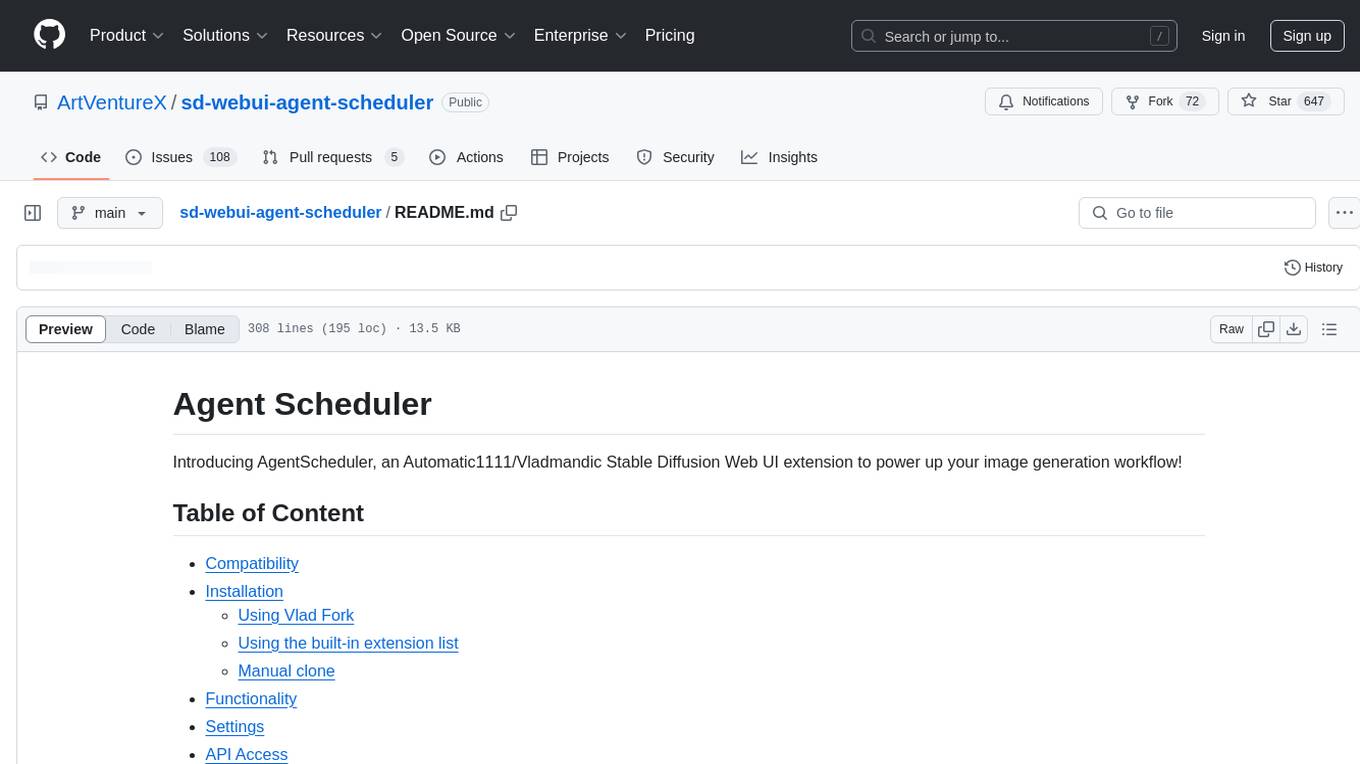
sd-webui-agent-scheduler
AgentScheduler is an Automatic/Vladmandic Stable Diffusion Web UI extension designed to enhance image generation workflows. It allows users to enqueue prompts, settings, and controlnets, manage queued tasks, prioritize, pause, resume, and delete tasks, view generation results, and more. The extension offers hidden features like queuing checkpoints, editing queued tasks, and custom checkpoint selection. Users can access the functionality through HTTP APIs and API callbacks. Troubleshooting steps are provided for common errors. The extension is compatible with latest versions of A1111 and Vladmandic. It is licensed under Apache License 2.0.

lexido
Lexido is an innovative assistant for the Linux command line, designed to boost your productivity and efficiency. Powered by Gemini Pro 1.0 and utilizing the free API, Lexido offers smart suggestions for commands based on your prompts and importantly your current environment. Whether you're installing software, managing files, or configuring system settings, Lexido streamlines the process, making it faster and more intuitive.
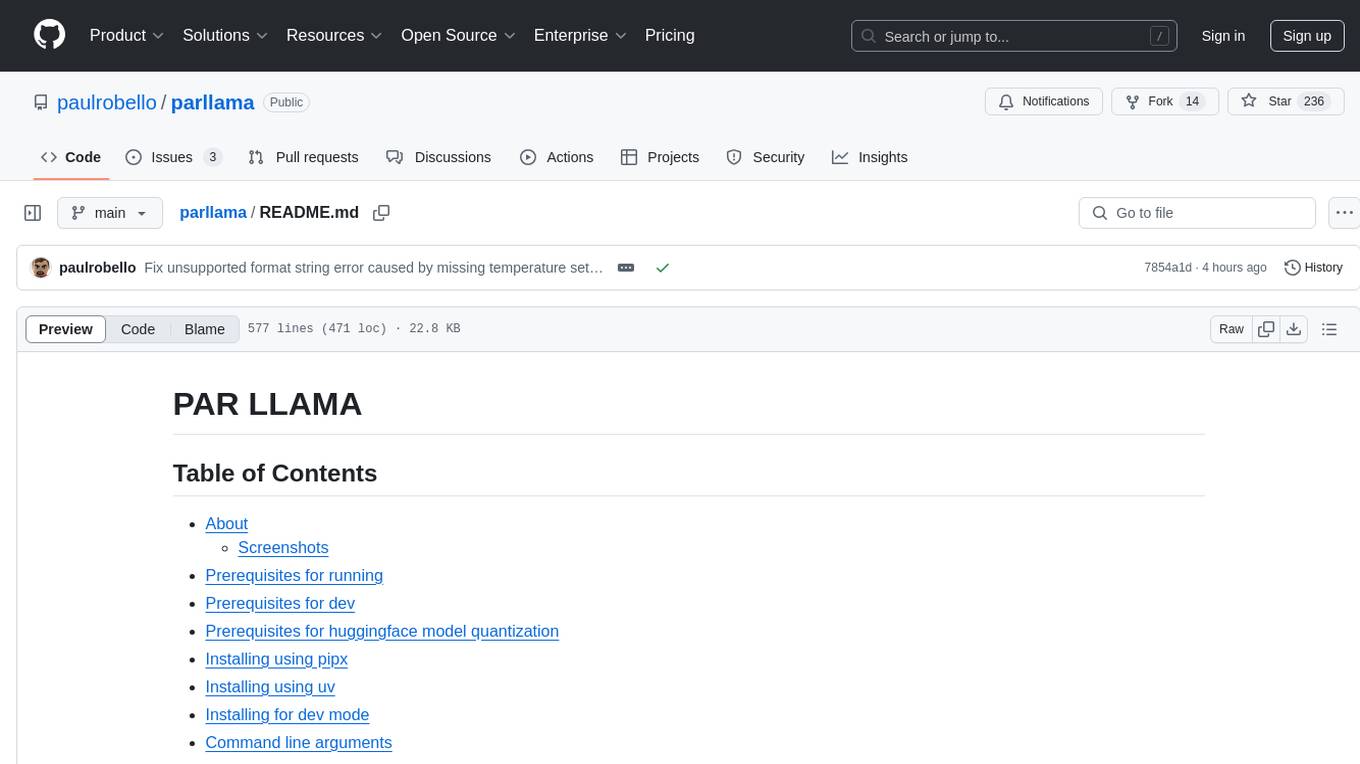
parllama
PAR LLAMA is a Text UI application for managing and using LLMs, designed with Textual and Rich and PAR AI Core. It runs on major OS's including Windows, Windows WSL, Mac, and Linux. Supports Dark and Light mode, custom themes, and various workflows like Ollama chat, image chat, and OpenAI provider chat. Offers features like custom prompts, themes, environment variables configuration, and remote instance connection. Suitable for managing and using LLMs efficiently.
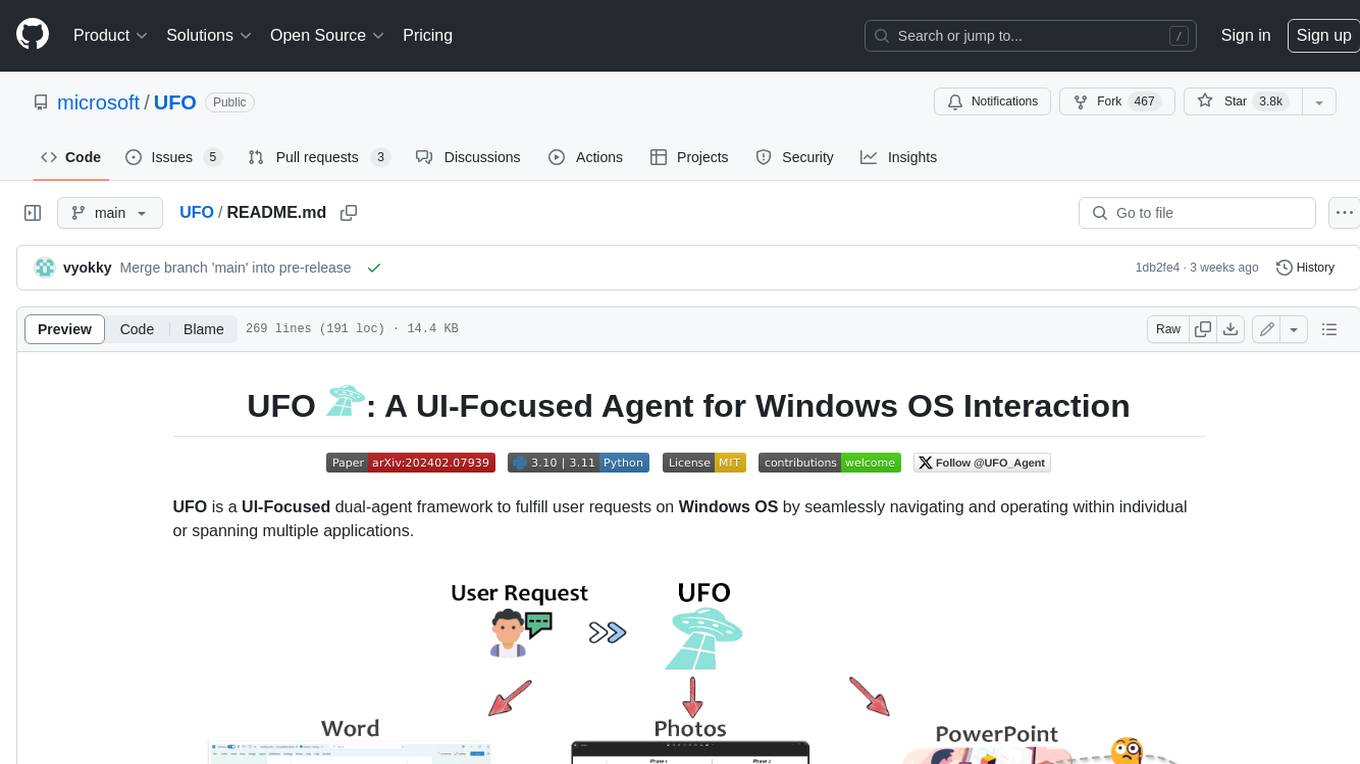
UFO
UFO is a UI-focused dual-agent framework to fulfill user requests on Windows OS by seamlessly navigating and operating within individual or spanning multiple applications.
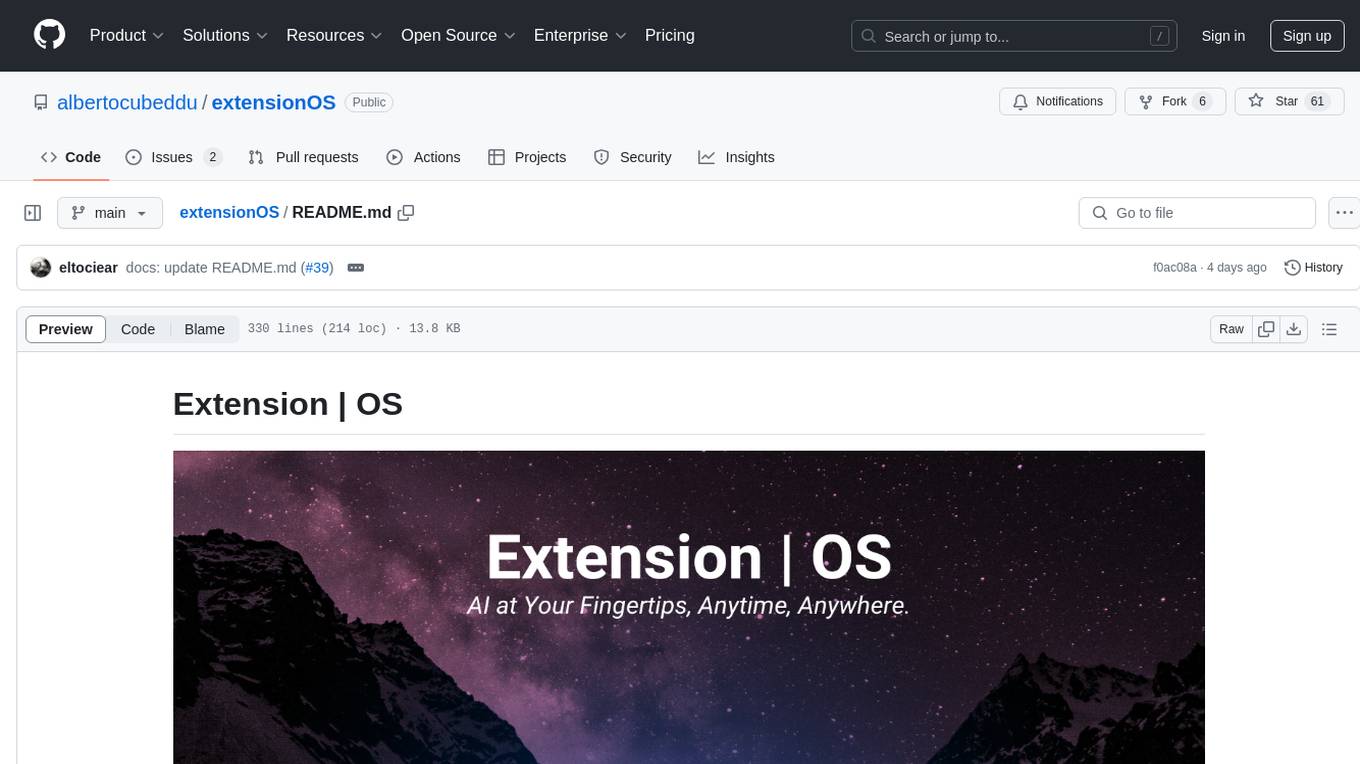
extensionOS
Extension | OS is an open-source browser extension that brings AI directly to users' web browsers, allowing them to access powerful models like LLMs seamlessly. Users can create prompts, fix grammar, and access intelligent assistance without switching tabs. The extension aims to revolutionize online information interaction by integrating AI into everyday browsing experiences. It offers features like Prompt Factory for tailored prompts, seamless LLM model access, secure API key storage, and a Mixture of Agents feature. The extension was developed to empower users to unleash their creativity with custom prompts and enhance their browsing experience with intelligent assistance.
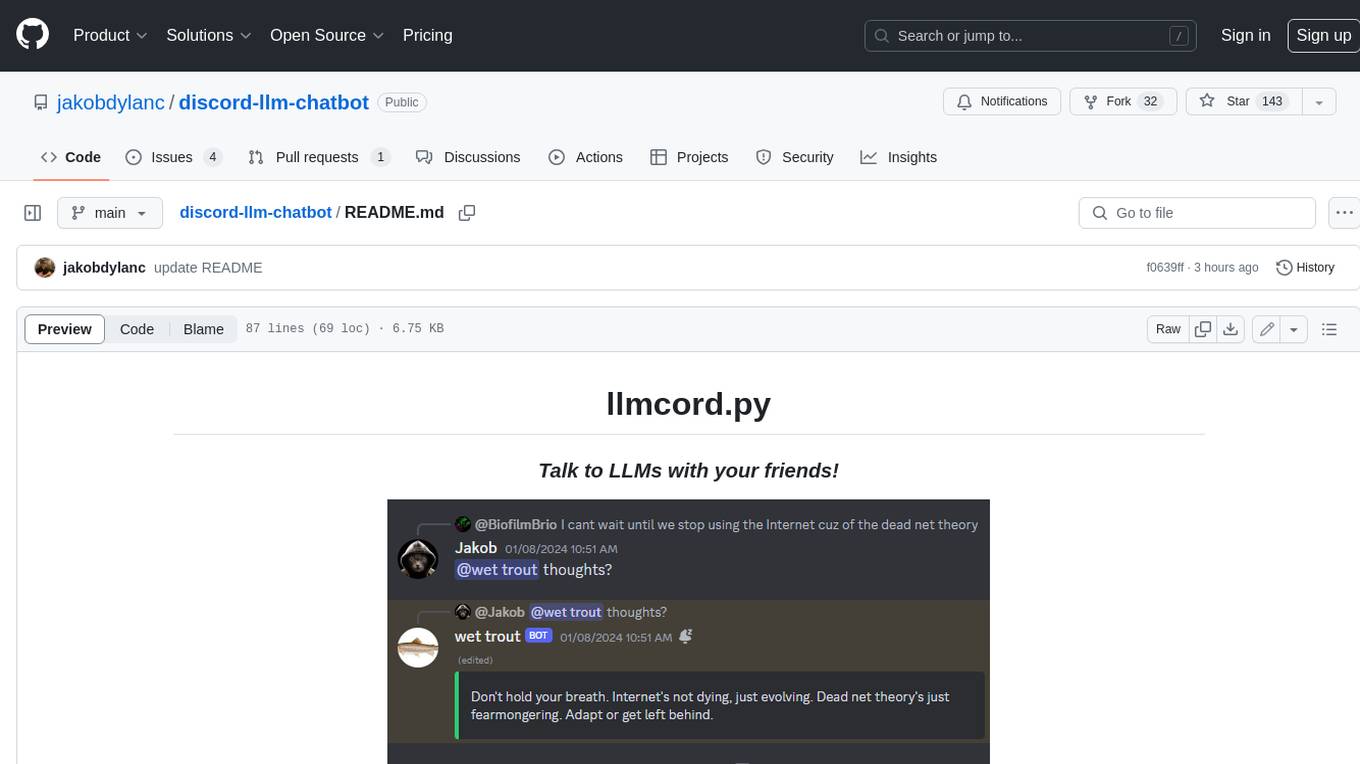
discord-llm-chatbot
llmcord.py enables collaborative LLM prompting in your Discord server. It works with practically any LLM, remote or locally hosted. ### Features ### Reply-based chat system Just @ the bot to start a conversation and reply to continue. Build conversations with reply chains! You can do things like: - Build conversations together with your friends - "Rewind" a conversation simply by replying to an older message - @ the bot while replying to any message in your server to ask a question about it Additionally: - Back-to-back messages from the same user are automatically chained together. Just reply to the latest one and the bot will see all of them. - You can seamlessly move any conversation into a thread. Just create a thread from any message and @ the bot inside to continue. ### Choose any LLM Supports remote models from OpenAI API, Mistral API, Anthropic API and many more thanks to LiteLLM. Or run a local model with ollama, oobabooga, Jan, LM Studio or any other OpenAI compatible API server. ### And more: - Supports image attachments when using a vision model - Customizable system prompt - DM for private access (no @ required) - User identity aware (OpenAI API only) - Streamed responses (turns green when complete, automatically splits into separate messages when too long, throttled to prevent Discord ratelimiting) - Displays helpful user warnings when appropriate (like "Only using last 20 messages", "Max 5 images per message", etc.) - Caches message data in a size-managed (no memory leaks) and per-message mutex-protected (no race conditions) global dictionary to maximize efficiency and minimize Discord API calls - Fully asynchronous - 1 Python file, ~200 lines of code
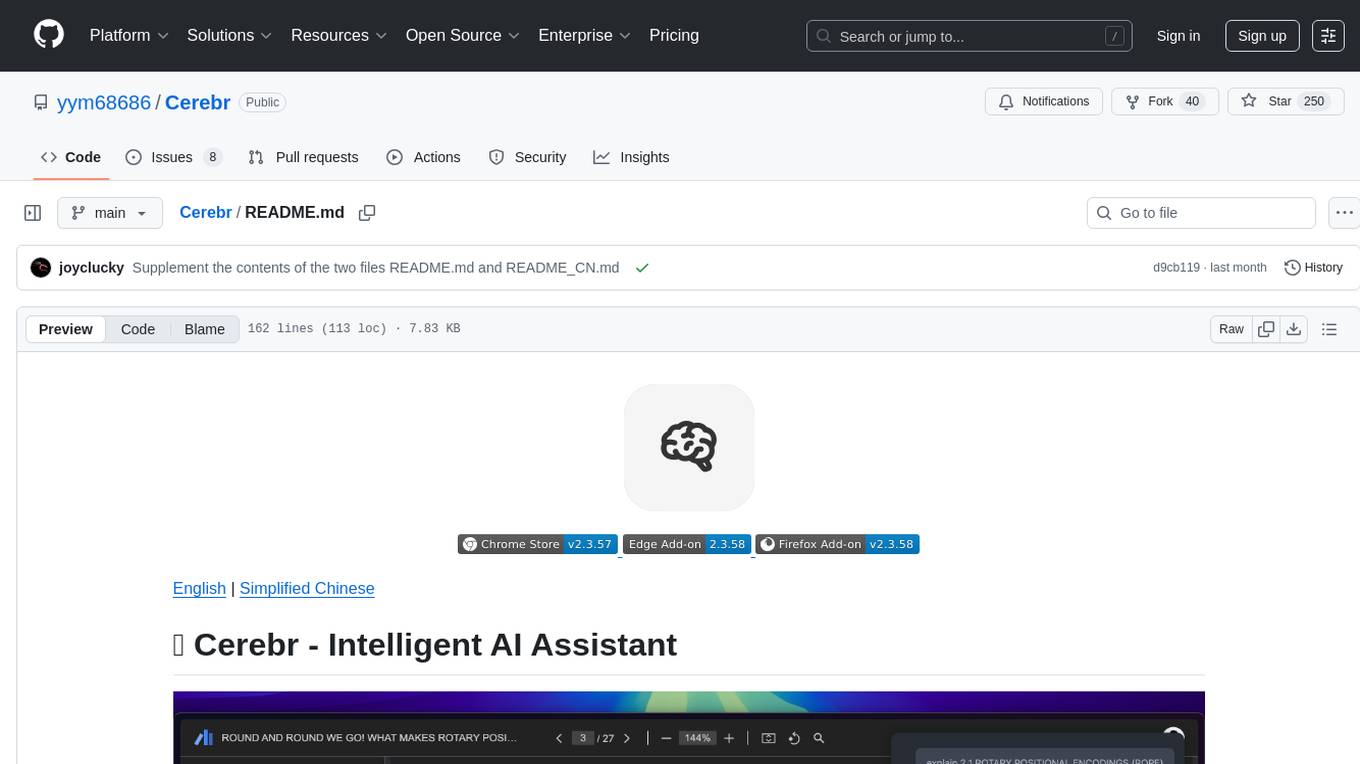
Cerebr
Cerebr is an intelligent AI assistant browser extension designed to enhance work efficiency and learning experience. It integrates powerful AI capabilities from various sources to provide features such as smart sidebar, multiple API support, cross-browser API configuration synchronization, comprehensive Q&A support, elegant rendering, real-time response, theme switching, and more. With a minimalist design and focus on delivering a seamless, distraction-free browsing experience, Cerebr aims to be your second brain for deep reading and understanding.
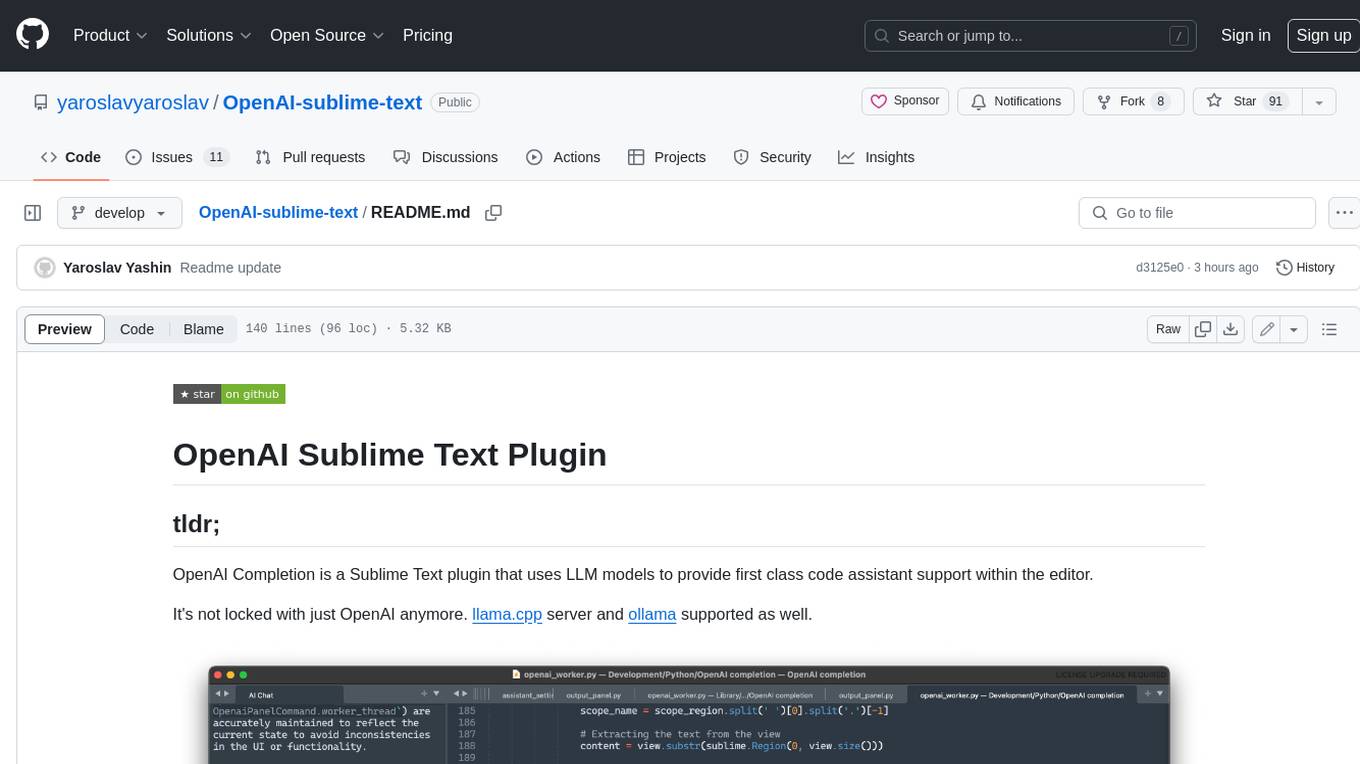
OpenAI-sublime-text
The OpenAI Completion plugin for Sublime Text provides first-class code assistant support within the editor. It utilizes LLM models to manipulate code, engage in chat mode, and perform various tasks. The plugin supports OpenAI, llama.cpp, and ollama models, allowing users to customize their AI assistant experience. It offers separated chat histories and assistant settings for different projects, enabling context-specific interactions. Additionally, the plugin supports Markdown syntax with code language syntax highlighting, server-side streaming for faster response times, and proxy support for secure connections. Users can configure the plugin's settings to set their OpenAI API key, adjust assistant modes, and manage chat history. Overall, the OpenAI Completion plugin enhances the Sublime Text editor with powerful AI capabilities, streamlining coding workflows and fostering collaboration with AI assistants.

DevDocs
DevDocs is a platform designed to simplify the process of digesting technical documentation for software engineers and developers. It automates the extraction and conversion of web content into markdown format, making it easier for users to access and understand the information. By crawling through child pages of a given URL, DevDocs provides a streamlined approach to gathering relevant data and integrating it into various tools for software development. The tool aims to save time and effort by eliminating the need for manual research and content extraction, ultimately enhancing productivity and efficiency in the development process.

langmanus
LangManus is a community-driven AI automation framework that combines language models with specialized tools for tasks like web search, crawling, and Python code execution. It implements a hierarchical multi-agent system with agents like Coordinator, Planner, Supervisor, Researcher, Coder, Browser, and Reporter. The framework supports LLM integration, search and retrieval tools, Python integration, workflow management, and visualization. LangManus aims to give back to the open-source community and welcomes contributions in various forms.

deep-research
Deep Research is a lightning-fast tool that uses powerful AI models to generate comprehensive research reports in just a few minutes. It leverages advanced 'Thinking' and 'Task' models, combined with an internet connection, to provide fast and insightful analysis on various topics. The tool ensures privacy by processing and storing all data locally. It supports multi-platform deployment, offers support for various large language models, web search functionality, knowledge graph generation, research history preservation, local and server API support, PWA technology, multi-key payload support, multi-language support, and is built with modern technologies like Next.js and Shadcn UI. Deep Research is open-source under the MIT License.
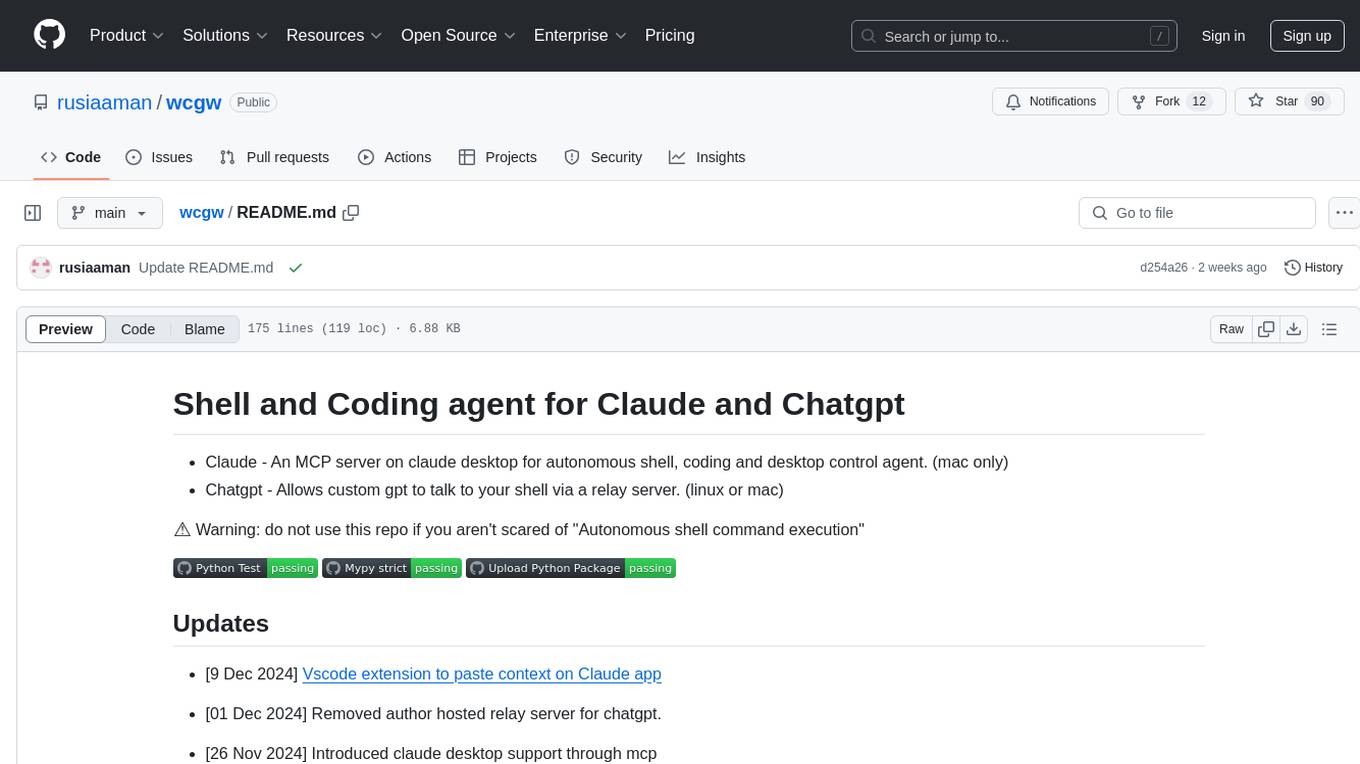
wcgw
wcgw is a shell and coding agent designed for Claude and Chatgpt. It provides full shell access with no restrictions, desktop control on Claude for screen capture and control, interactive command handling, large file editing, and REPL support. Users can use wcgw to create, execute, and iterate on tasks, such as solving problems with Python, finding code instances, setting up projects, creating web apps, editing large files, and running server commands. Additionally, wcgw supports computer use on Docker containers for desktop control. The tool can be extended with a VS Code extension for pasting context on Claude app and integrates with Chatgpt for custom GPT interactions.
For similar tasks

AiogramShopBot
AiogramShopBot is a software product based on Aiogram3 and SQLAlchemy that allows you to automate sales of digital goods in Telegram. One of the bot's advantages is that AiogramShopBot implements the ability to top up with Bitcoin, Litecoin, Solana and stablecoins in the TRC20 and ERC20 networks, which allows you to sell digital goods worldwide. The bot provides features for user registration, balance top-up, purchase of goods, purchase history, admin functionalities like announcements, inventory management, user management, analytics & reports, and multibot functionality. It supports encryption via SQLCipher, multiple cryptocurrencies, and offers a user-friendly interface for managing sales and transactions.
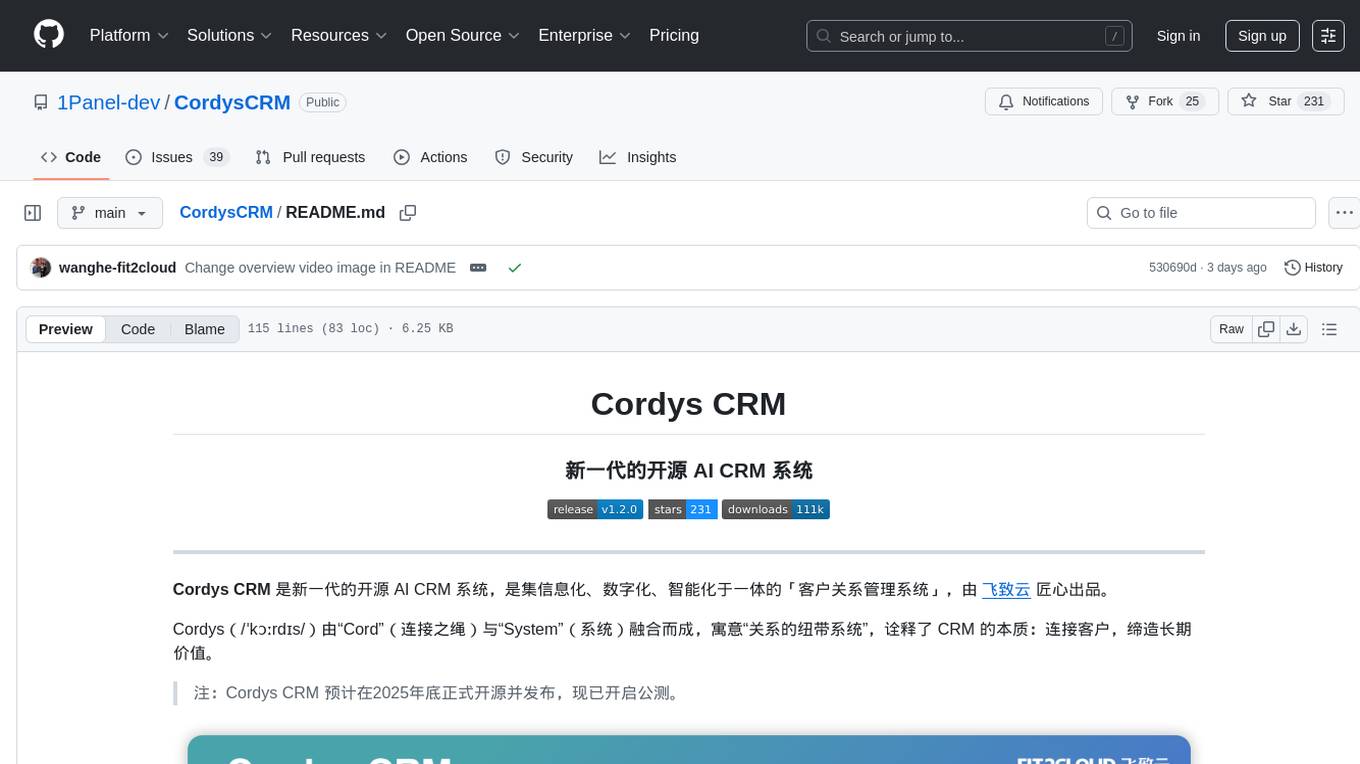
CordysCRM
Cordys CRM is a next-generation open-source AI CRM system that integrates informatization, digitalization, and intelligence into a 'Customer Relationship Management System'. It offers modern user experience, flexible and configurable forms, processes, and permissions to help enterprises achieve sales automation easily. It ensures data security with private deployment, allowing complete control over customer data and business information. With BI capabilities from DataEase and intelligent querying from SQLBot, it enables efficient data analysis and visualization. Additionally, it provides AI capabilities through the MCP Server and MaxKB, facilitating various sales intelligence applications.

gitingest
GitIngest is a tool that allows users to turn any Git repository into a prompt-friendly text ingest for LLMs. It provides easy code context by generating a text digest from a git repository URL or directory. The tool offers smart formatting for optimized output format for LLM prompts and provides statistics about file and directory structure, size of the extract, and token count. GitIngest can be used as a CLI tool on Linux and as a Python package for code integration. The tool is built using Tailwind CSS for frontend, FastAPI for backend framework, tiktoken for token estimation, and apianalytics.dev for simple analytics. Users can self-host GitIngest by building the Docker image and running the container. Contributions to the project are welcome, and the tool aims to be beginner-friendly for first-time contributors with a simple Python and HTML codebase.
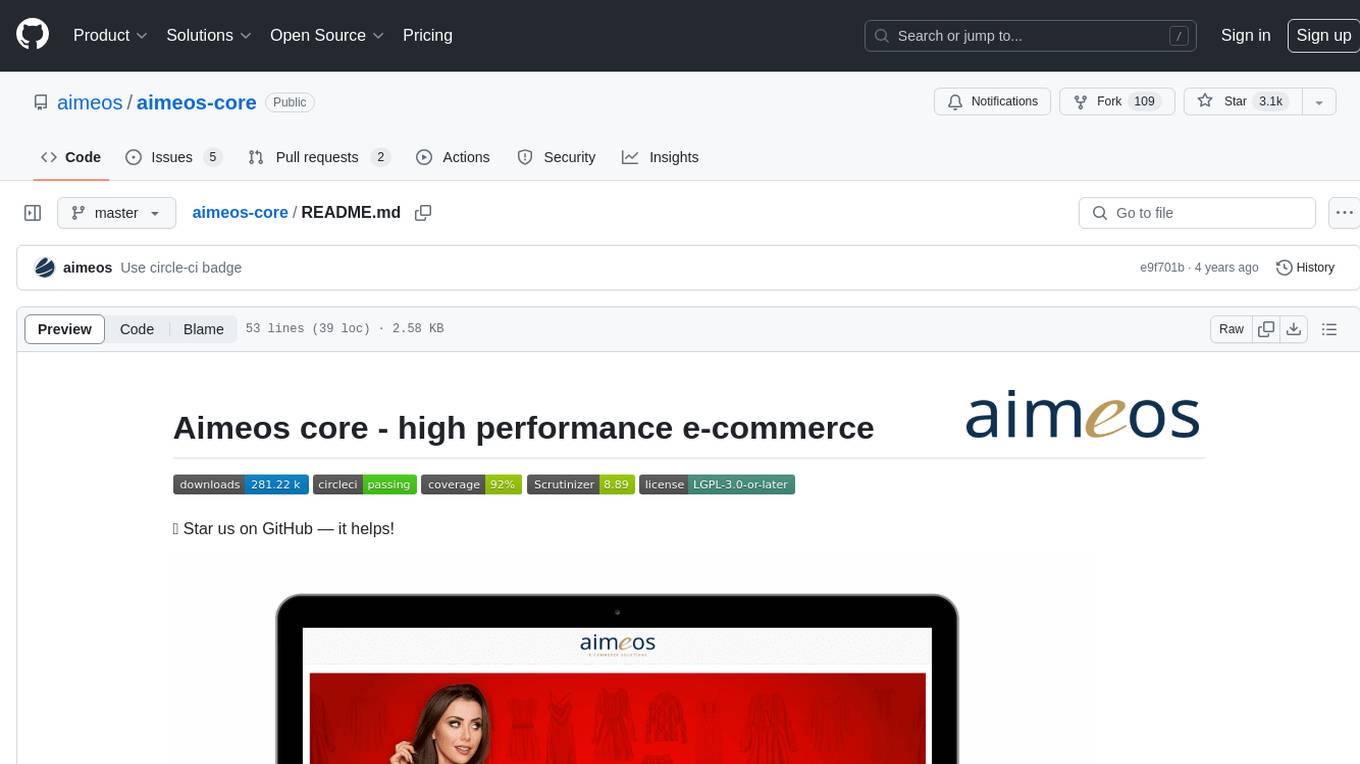
aimeos-core
Aimeos is an Open Source e-commerce framework for online shops consisting of the e-commerce library, the administration interface and different front-ends. It offers a modular stack that provides flexibility and speed. Unlike other shop systems, Aimeos allows users to choose from several user front-ends and customize them according to their needs or create their own. It is suitable for medium to large businesses requiring seamless integration into existing systems like content management, customer relationship management, or enterprise resource planning systems. Aimeos also serves as a base for portals or marketplaces.
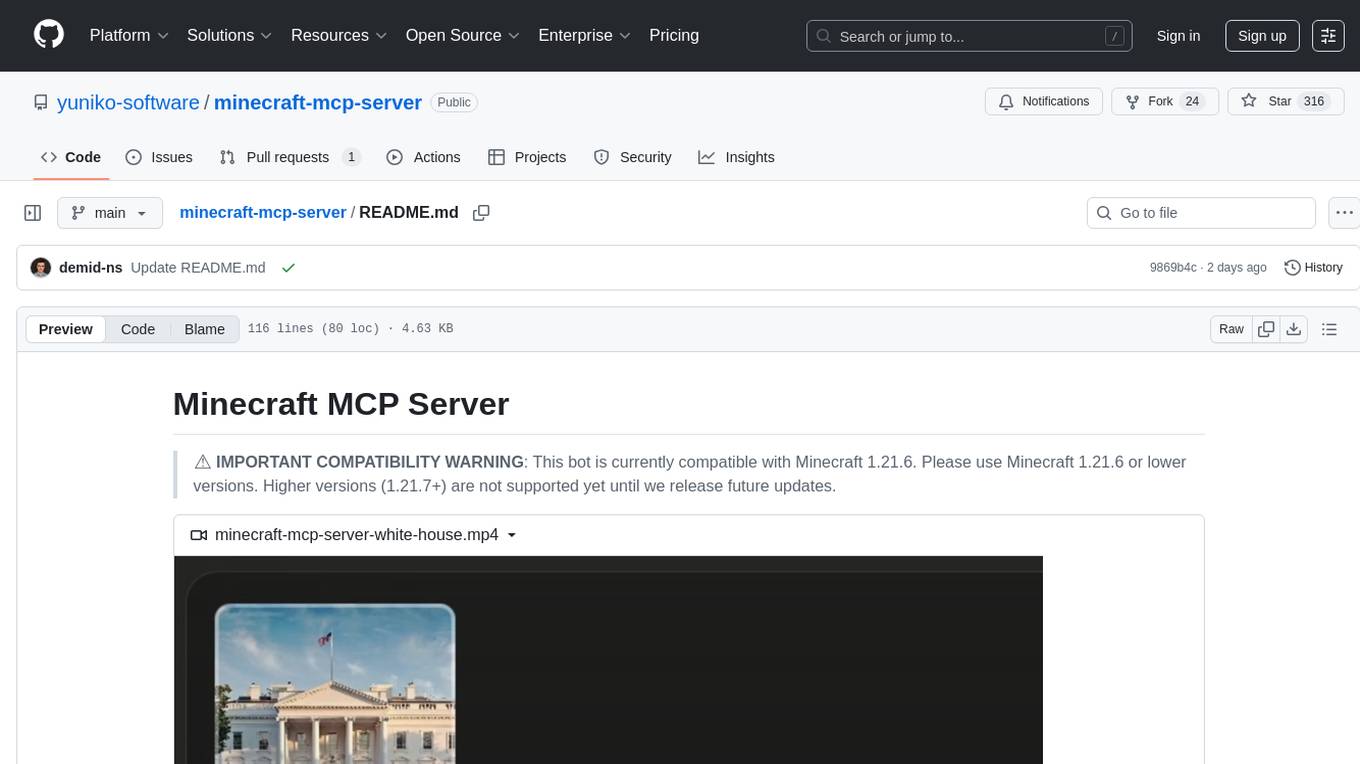
minecraft-mcp-server
Minecraft MCP Server is a bot powered by large language models and Mineflayer API. It uses the Model Context Protocol (MCP) to enable models like Claude to control a Minecraft character. The bot allows users to interact with Minecraft through commands and chat messages, facilitating tasks such as movement, inventory management, block interaction, entity interaction, and more. Users can also upload images of buildings and ask the bot to build them. The tool is designed to work with Claude Desktop and requires specific configurations for Minecraft and MCP clients. Contributions to the project, including refactoring, testing, documentation, and new functionality, are welcome.
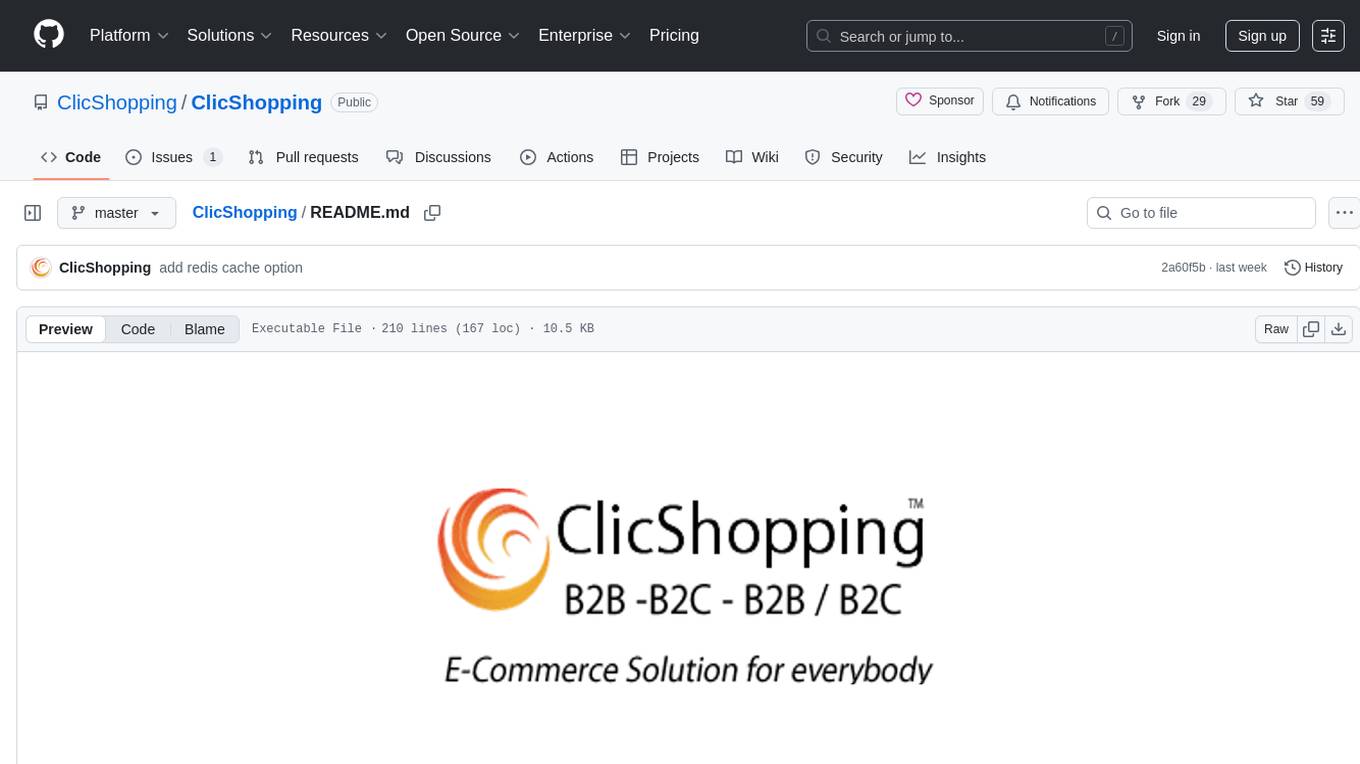
ClicShopping
ClicShopping AI™ is an open-source Ecommerce platform powered by Generative AI, designed for B2B, B2C, and B2B-B2C businesses. It offers seamless shopping experiences, advanced AI integration, modular architecture for customization, and responsive design across devices. With features like GPT API integration, RAG-powered Business Intelligence Agent, multi-model AI support, and security compliance, ClicShopping AI™ is a comprehensive solution for online businesses. It also provides internationalization support, performance analytics, server performance optimization, content management, API connections, shipping and payment options, and a marketplace for additional modules and apps.
For similar jobs

AiogramShopBot
AiogramShopBot is a software product based on Aiogram3 and SQLAlchemy that allows you to automate sales of digital goods in Telegram. One of the bot's advantages is that AiogramShopBot implements the ability to top up with Bitcoin, Litecoin, Solana and stablecoins in the TRC20 and ERC20 networks, which allows you to sell digital goods worldwide. The bot provides features for user registration, balance top-up, purchase of goods, purchase history, admin functionalities like announcements, inventory management, user management, analytics & reports, and multibot functionality. It supports encryption via SQLCipher, multiple cryptocurrencies, and offers a user-friendly interface for managing sales and transactions.
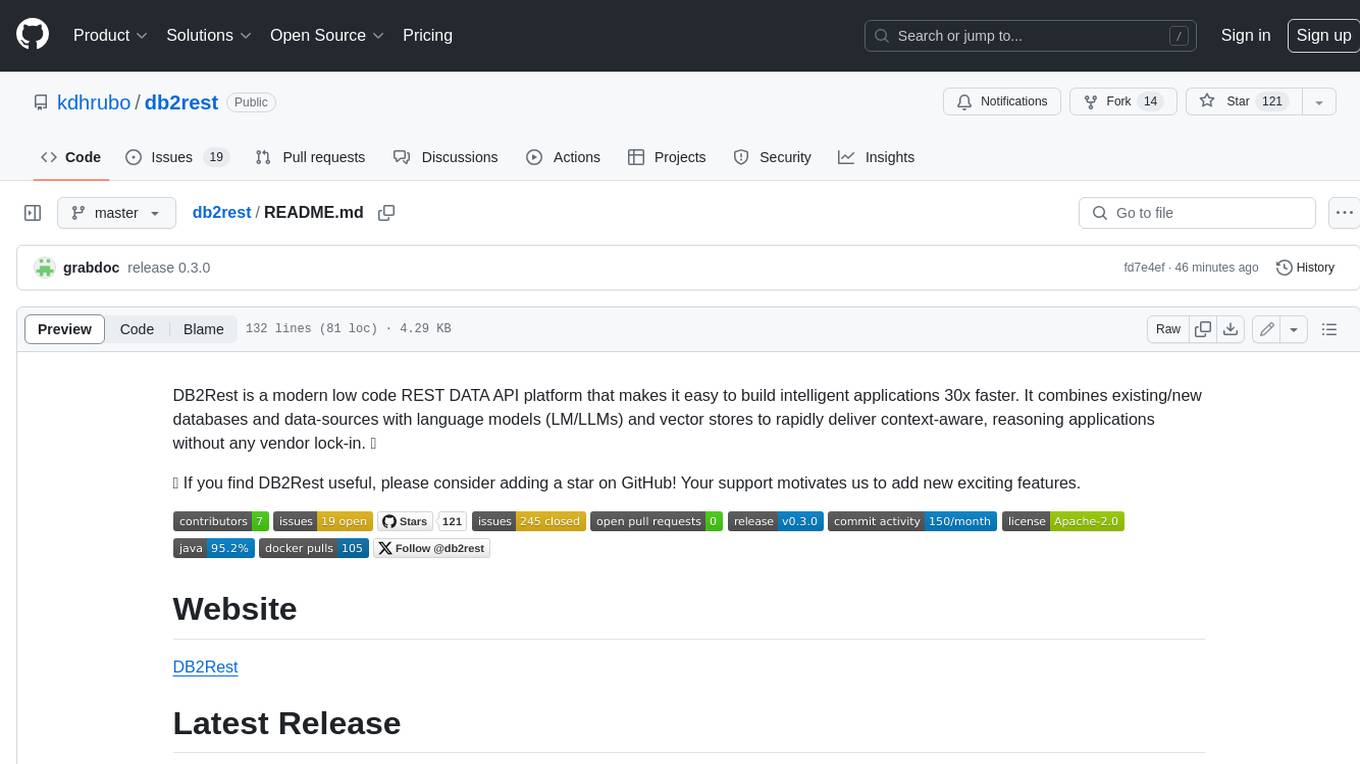
db2rest
DB2Rest is a modern low-code REST DATA API platform that simplifies the development of intelligent applications. It seamlessly integrates existing and new databases with language models (LMs/LLMs) and vector stores, enabling the rapid delivery of context-aware, reasoning applications without vendor lock-in.

tidb
TiDB is an open-source distributed SQL database that supports Hybrid Transactional and Analytical Processing (HTAP) workloads. It is MySQL compatible and features horizontal scalability, strong consistency, and high availability.

infinity
Infinity is an AI-native database designed for LLM applications, providing incredibly fast full-text and vector search capabilities. It supports a wide range of data types, including vectors, full-text, and structured data, and offers a fused search feature that combines multiple embeddings and full text. Infinity is easy to use, with an intuitive Python API and a single-binary architecture that simplifies deployment. It achieves high performance, with 0.1 milliseconds query latency on million-scale vector datasets and up to 15K QPS.
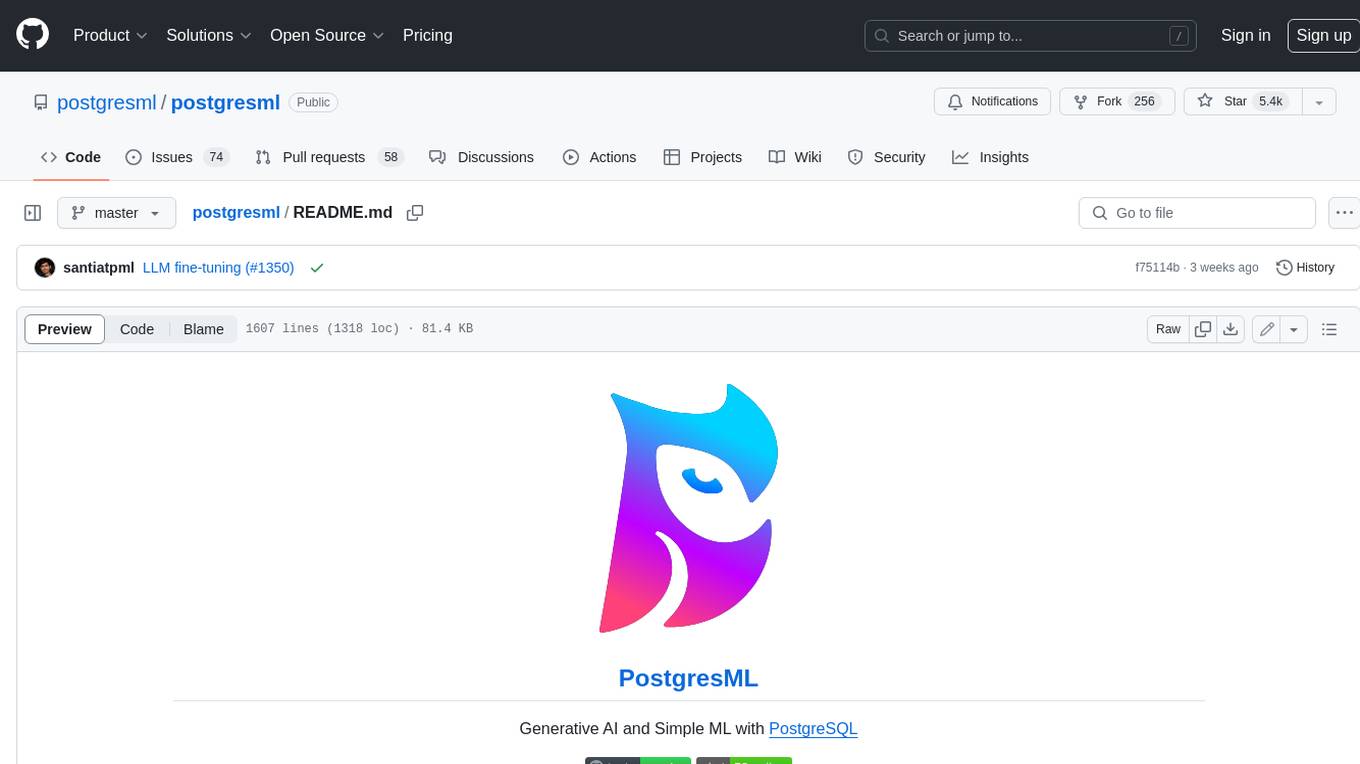
postgresml
PostgresML is a powerful Postgres extension that seamlessly combines data storage and machine learning inference within your database. It enables running machine learning and AI operations directly within PostgreSQL, leveraging GPU acceleration for faster computations, integrating state-of-the-art large language models, providing built-in functions for text processing, enabling efficient similarity search, offering diverse ML algorithms, ensuring high performance, scalability, and security, supporting a wide range of NLP tasks, and seamlessly integrating with existing PostgreSQL tools and client libraries.
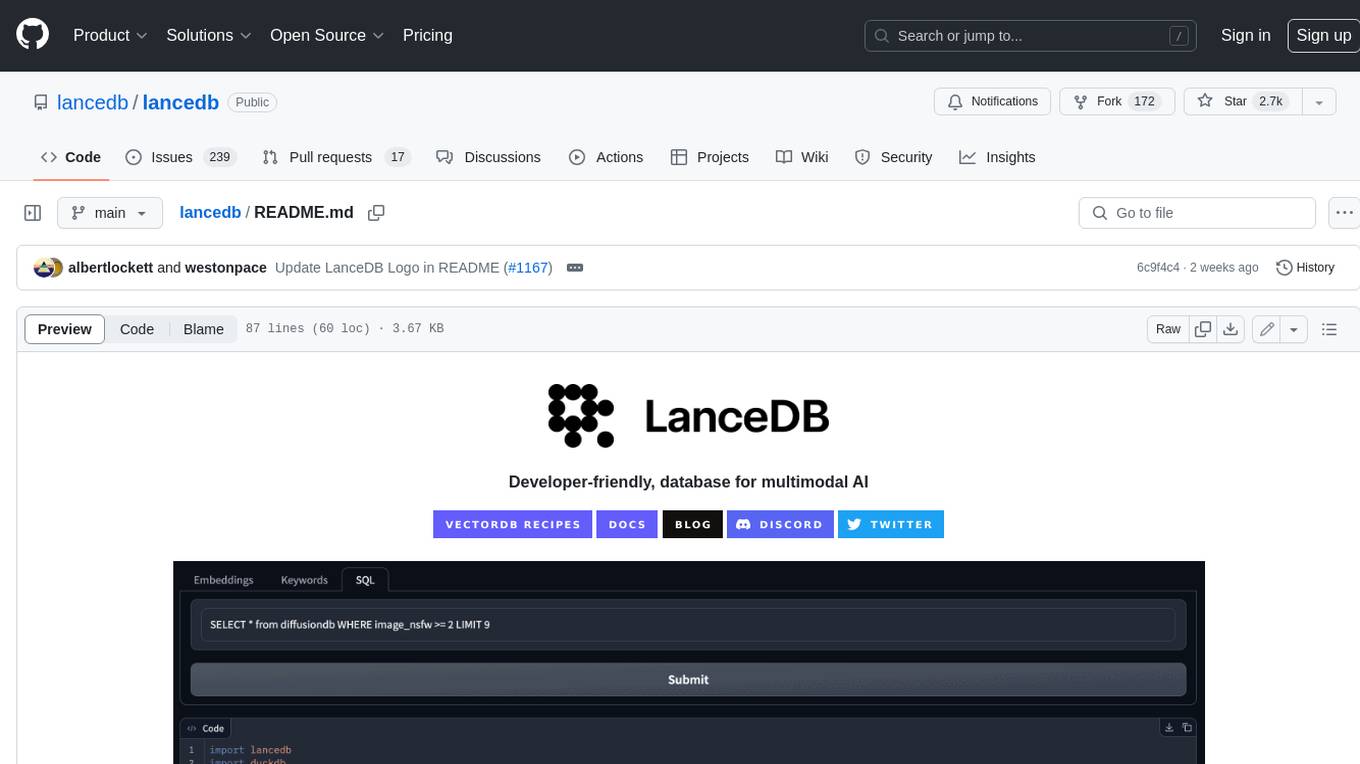
lancedb
LanceDB is an open-source database for vector-search built with persistent storage, which greatly simplifies retrieval, filtering, and management of embeddings. The key features of LanceDB include: Production-scale vector search with no servers to manage. Store, query, and filter vectors, metadata, and multi-modal data (text, images, videos, point clouds, and more). Support for vector similarity search, full-text search, and SQL. Native Python and Javascript/Typescript support. Zero-copy, automatic versioning, manage versions of your data without needing extra infrastructure. GPU support in building vector index(*). Ecosystem integrations with LangChain 🦜️🔗, LlamaIndex 🦙, Apache-Arrow, Pandas, Polars, DuckDB, and more on the way. LanceDB's core is written in Rust 🦀 and is built using Lance, an open-source columnar format designed for performant ML workloads.
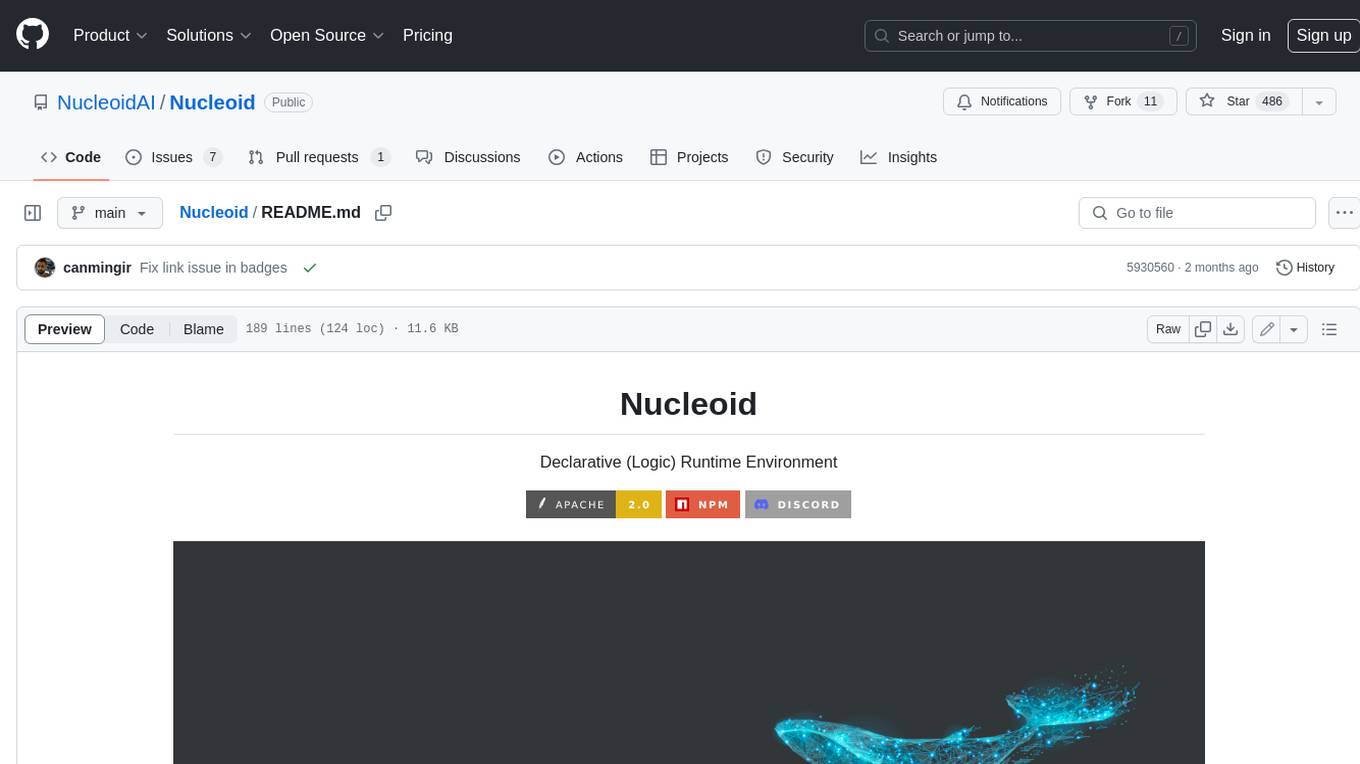
Nucleoid
Nucleoid is a declarative (logic) runtime environment that manages both data and logic under the same runtime. It uses a declarative programming paradigm, which allows developers to focus on the business logic of the application, while the runtime manages the technical details. This allows for faster development and reduces the amount of code that needs to be written. Additionally, the sharding feature can help to distribute the load across multiple instances, which can further improve the performance of the system.
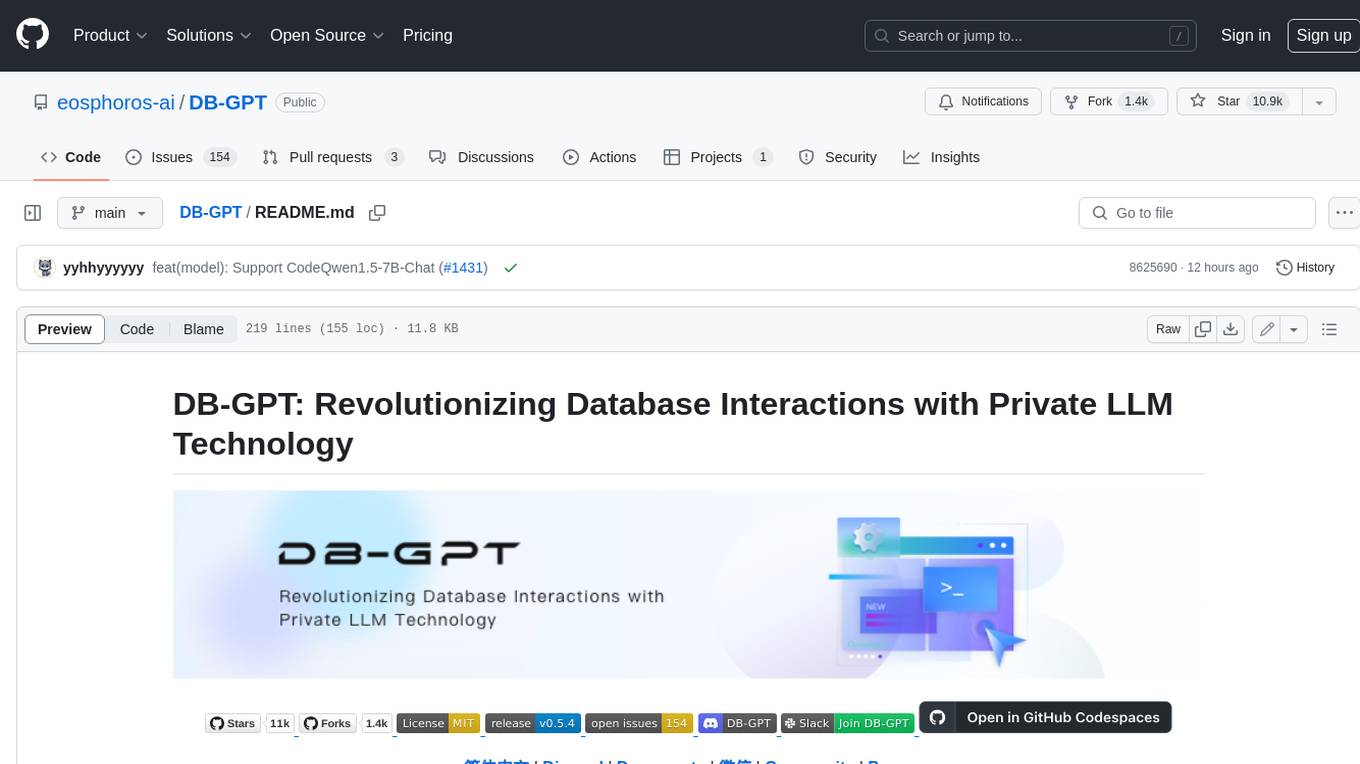
DB-GPT
DB-GPT is an open source AI native data app development framework with AWEL(Agentic Workflow Expression Language) and agents. It aims to build infrastructure in the field of large models, through the development of multiple technical capabilities such as multi-model management (SMMF), Text2SQL effect optimization, RAG framework and optimization, Multi-Agents framework collaboration, AWEL (agent workflow orchestration), etc. Which makes large model applications with data simpler and more convenient.


























